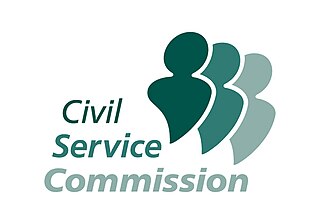Related Research Articles

The Civil Service of the United Kingdom is the permanent bureaucracy or secretariat of Crown employees that supports His Majesty's Government, which is led by a cabinet of ministers chosen by the Prime Minister of the United Kingdom of Great Britain and Northern Ireland.

The civil service is a collective term for a sector of government composed mainly of career civil service personnel hired rather than elected, whose institutional tenure typically survives transitions of political leadership. A civil service official, also known as a public servant or public employee, is a person employed in the public sector by a government department or agency for public sector undertakings. Civil servants work for central and state governments, and answer to the government, not a political party.
The Charity Commission for England and Wales is a non-ministerial department of His Majesty's Government that regulates registered charities in England and Wales and maintains the Central Register of Charities. Its counterparts in Scotland and Northern Ireland are the Office of the Scottish Charity Regulator and the Charity Commission for Northern Ireland.
The Independent Commission on Policing for Northern Ireland was established in 1998 as part of the Belfast Agreement, intended as a major step in the Northern Ireland peace process. Chaired by Conservative politician and the last Governor of Hong Kong Chris Patten, it was better known as the Patten Commission and it produced a report in 1999 known as the Patten Report. The other members of the Commission were Maurice Hayes, Peter Smith, Kathleen O'Toole, Gerald W. Lynch, Sir John Smith, Lucy Woods and Professor Clifford Shearing. The Secretary to the Commission was Bob Peirce, who drafted the report.

A European commissioner is a member of the 27-member European Commission. Each member within the Commission holds a specific portfolio. The commission is led by the president of the European Commission. In simple terms they are the equivalent of government ministers.
The Director General of Police (DGP) is the highest-ranking police officer in Indian states and union territories. The DGP is appointed by the cabinet and holds a three-star rank. The DGP is responsible for overseeing the entire police force and law enforcement activities within their respective jurisdiction. This position holds significant authority and plays a crucial role in maintaining law and order, implementing crime prevention strategies, and ensuring public safety. The DGP is usually appointed by the state government and works closely with other law enforcement agencies and government officials to uphold the rule of law and protect citizens' rights.

The Hong Kong Civil Service is managed by 13 policy bureaux in the Government Secretariat, and 67 departments and agencies, mostly staffed by civil servants. The Secretary for the Civil Service (SCS) is one of the Principal Officials appointed under the Accountability System and a Member of the Executive Council. He heads the Civil Service Bureau (CSB) of the Government Secretariat and is responsible to the Chief Executive (CE) for civil service policies as well as the overall management and development of the civil service. His primary role is to ensure that the civil service serves the best interests of the community and delivers various services in a trustworthy, efficient and cost effective manner. The CSB assumes overall policy responsibility for the management of the civil service, including such matters as appointment, pay and conditions of service, staff management, manpower planning, training, and discipline.
A civil service commission is a government agency or public body that is established by the constitution, or by the legislature, to regulate the employment and working conditions of civil servants, oversee hiring and promotions, and promote the values of the public service. Its role is roughly analogous to that of the human resources department in corporations. Civil service commissions are often independent from elected politicians, maintaining the separation of the permanent, professional civil service from government ministers.
The Civil service of Ireland is the collective term for the permanent staff of the departments of state and certain state agencies who advise and work for the Government of Ireland. It consists of two broad components, the Civil service of the Government and the Civil service of the State. Whilst the differences between these two components are largely theoretical, some fundamental operational distinctions exist.
The Judicial Appointments Commission (JAC) is an independent commission that selects candidates for judicial office in courts and tribunals in England and Wales and for some tribunals whose jurisdiction extends to Scotland or Northern Ireland.

The Northern Ireland Civil Service is the permanent bureaucracy of employees that supports the Northern Ireland Executive, the devolved government of Northern Ireland.
Public water supply and sanitation in the United Kingdom is characterised by universal access and generally good service quality. A salient feature of the sector in the United Kingdom compared to other developed countries is the diversity of institutional arrangements between the constituting parts of the UK, which are each described in separate articles, while this article is devoted to some common issues across the United Kingdom.

The European Personnel Selection Office (EPSO) is responsible for selecting staff to work for the institutions and agencies of the European Union including the European Parliament, the European Council, the Council of the European Union, the European Commission, the European Court of Justice, the Court of Auditors, the European External Action Service, the Economic and Social Committee, the Committee of the Regions and the European Ombudsman. Each institution is then able to recruit staff from among the pool of candidates selected by EPSO. On average, EPSO receives around 60,000-70,000 applications a year with around 1,500-2,000 candidates recruited by the European Union institutions.
The Public Service of Canada is the civilian workforce of the Government of Canada's departments, agencies, and other public bodies.

The European Civil Service is a generic term applied to all staff serving the institutions and agencies of the European Union (EU). Although recruitment is sometimes done jointly, each institution is responsible for its own internal structures and hierarchies.

The Civil Service Commission regulates recruitment to the United Kingdom Civil Service, providing assurance that appointments are on merit after fair and open competition, and hears appeals under the Civil Service Code. The commission is independent of government and the Civil Service.
The Public Service Commission of Canada is an independent government agency that safeguards merit-based hiring, non-partisanship, representativeness of Canada's diversity, and the use of both official languages in the Canadian public service. The PSC aims to protect the integrity of hiring and promotion within the public service. As well, the Commission works to protect the political impartiality and non-partisanship of public servants. The Commission develops staffing policies and provides guidance to public service managers and recruits Canadians into the public service. To ensure the staffing system in the government is properly maintained, the PSC has the authority to audit and investigate to ensure departments and managers make improvements. While typical government departments are headed by Ministers, the PSC is an independent agency that is headed by a President who reports to the Canadian Parliament.

The constitution of the United Kingdom comprises the written and unwritten arrangements that establish the United Kingdom of Great Britain and Northern Ireland as a political body. Unlike in most countries, no official attempt has been made to codify such arrangements into a single document, thus it is known as an uncodified constitution. This enables the constitution to be easily changed as no provisions are formally entrenched.

The area of freedom, security and justice (AFSJ) of the European Union (EU) is a policy domain concerning home affairs and migration, justice as well as fundamental rights, developed to address the challenges posed to internal security by collateral effects of the free movement of people and goods in the absence of border controls or customs inspection throughout the Schengen Area, as well as to safeguard adherence to the common European values through ensuring that the fundamental rights of people are respected across the EU.

The National Infrastructure Commission is the executive agency responsible for providing expert advice to the UK Government on infrastructure challenges facing the UK.
References
- ↑ "What We Do". Civil Service Commissioners for Northern Ireland. Civil Service Commissioners for Northern Ireland. Retrieved 10 July 2024.
Commissioners are established by statute to uphold the Merit Principle in selection for appointment to the Northern Ireland Civil Service (NICS). Their aim is to ensure that this should be on merit, on the basis of fair and open competition.
- ↑ "Legislation". Civil Service Commissioners for Northern Ireland. Civil Service Commissioners for Northern Ireland. Retrieved 10 July 2024.
Civil Service Commissioners (NI) Order 1999
- ↑ "Civil Service Commissioners for Northern Ireland General Regulations 2007" (PDF). Civil Service Commissioners for Northern Ireland. Civil Service Commissioners for Northern Ireland. 9 January 2007. Retrieved 10 July 2024.
The Civil Service Commissioners for Northern Ireland ("The Commissioners") in exercise of their powers under the terms of Articles 4(2) and 6 of the Civil Service Commissioners (Northern Ireland) Order 1999 ("the Order"), and with the approval ofthe Secretary of State, hereby make the following Regulations.